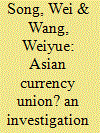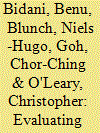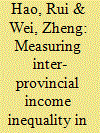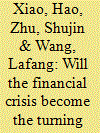|
|
|
Sort Order |
|
|
|
Items / Page
|
|
|
|
|
|
|
| Srl | Item |
| 1 |
ID:
093650


|
|
|
|
|
| Publication |
2009.
|
| Summary/Abstract |
This paper applies Optimum Currency Area (OCA) theory to investigate the suitability of Asian currency union and its membership, in which China is taken as the central country. Cluster analysis is applied for this study. Both hierarchical clustering and fuzzy clustering approaches are used. The study finds that Japan, Korea, Hong Kong, Malaysia, Philippines, Singapore, Thailand, Cambodia and Vietnam are most converged with China, and these countries are more likely to be the member countries of the Asian Currency Union.
|
|
|
|
|
|
|
|
|
|
|
|
|
|
|
|
| 2 |
ID:
086212


|
|
|
|
|
| Publication |
2009.
|
| Summary/Abstract |
Recent years have seen a surge in work on the impacts of active labor market programs for numerous countries. However, little evidence has been presented on the effectiveness of such programs in China. Recent economic reforms, associated with massive lay-offs, and the accompanying public retraining programs make China fertile ground for rigorous impact evaluations. This study uses survey data from the two large industrial cities Shenyang and Wuhan, covering the period 1998 to 2000, to evaluate retraining programs for over 2000 workers two years after they had been observed as displaced and unemployed. Using a comparison group design, this study is, to our knowledge, the first evaluation of its kind in China. The evidence suggests that retraining helped workers find jobs in Wuhan, but had little effect in Shenyang. The study raises questions about the overall effectiveness of retraining expenditures, and it offers some directions for policy-makers about future interventions to help laid-off workers.
|
|
|
|
|
|
|
|
|
|
|
|
|
|
|
|
| 3 |
ID:
093647


|
|
|
|
|
| Publication |
2009.
|
| Summary/Abstract |
This study examines whether exporters become more productive through estimating a production function using Chinese firm-level data from 1997 to 2000. The results indicate that exporters are more productive and, more importantly, that export strategies promote the productivity of these firms. The test for the relative timing of export behaviour and gains in productivity provides strong evidence for the existence of learning-by-exporting effects rather than self-selection effects. These results are robust when controlling simultaneous bias and selection bias by using a fixed-effects model, SYS-GMM estimation and semi-parametric estimation.
|
|
|
|
|
|
|
|
|
|
|
|
|
|
|
|
| 4 |
ID:
086209


|
|
|
|
|
| Publication |
2009.
|
| Summary/Abstract |
China's regional inequality is a hotly debated topic in the literature, but the fundamental issue of measurement has somehow escaped from the deliberations. In this paper, we select several commonly used income indicators, inequality indices and concepts to measure China's inter-provincial inequality and compare the results. We find China's inter-provincial inequality is very sensitive to different measurements. These sensitivity analyses help us to understand the ongoing debates on China's regional income inequality. We also conduct a cross-country comparison to illustrate the broad ranking of China's regional inequality in the world. We find that China's regional inequality appears not to be as high as usually perceived, despite approaching an alarming level.
|
|
|
|
|
|
|
|
|
|
|
|
|
|
|
|
| 5 |
ID:
093648


|
|
|
|
|
| Publication |
2009.
|
| Summary/Abstract |
This paper investigates productivity spillover effects of FDI and relates it to the capital- or labour-intensive nature of the industry. Using a panel data set of 35 industries in China, it shows that the presence and magnitude of FDI spillover effects vary by different channels and the nature of the industry. On average, FDI has no horizontal spillover effects but has positive backward linkage effects. However, there are substantial differences in FDI spillover effects via demonstration, competition and labour mobility between capital- and labour-intensive industries. The findings have important policy implications.
|
|
|
|
|
|
|
|
|
|
|
|
|
|
|
|
| 6 |
ID:
093649


|
|
|
|
|
| Publication |
2009.
|
| Summary/Abstract |
Has China's strategy of 'exchanging market for technology' been successful? This paper analyses the effectiveness of this strategy based on the duopoly model of vertical product differentiation by Choi and Shin (1992). It is shown that the outcome is influenced by technology gap and absorptive capacity. The profit of a developing country firm shows an inverted U-shaped relationship with its technology level when holding the foreign firm's technology level constant. In the process of technology improvement by imitation, the developing country firm faces a limit on imitation. A developing country may benefit from the strategy of 'exchanging market for technology' at the early stage and needs to bring in FDI with advanced technology so that it can overcome restraints from the limit of imitation. For one with a smaller technology gap with the home country of FDI, the country in the long run has to achieve technological progress through innovation.
|
|
|
|
|
|
|
|
|
|
|
|
|
|
|
|
| 7 |
ID:
086213


|
|
|
|
|
| Publication |
2009.
|
| Summary/Abstract |
Chinese policy makers are aware that developing China's managers is crucial to creating competitive advantage in the post-WTO period. Consequently, large numbers of Chinese managers have been sent abroad, particularly to Western and developed countries, on management training courses in order to bring new ideas and approaches to their organisations. This paper questions whether these training programmes have successfully achieved their objectives. An empirical study is adopted to invite the opinions of different stakeholder groups involved in the training process (526 participants). Specific characteristics of China's overseas management training are discussed and problem areas are also explored.
|
|
|
|
|
|
|
|
|
|
|
|
|
|
|
|
| 8 |
ID:
093646


|
|
|
|
|
| Publication |
2009.
|
| Summary/Abstract |
China has been changing fast socially, economically and politically since opening up to the world economy in 1978.With the liberalisation of dysfunctional systems of central planning,state ownership,government regulations and trade and foreign investment rules and reforms in agriculture, industry, and the financial, banking and service sectors, China has performed exceptionally well by most standards.
|
|
|
|
|
|
|
|
|
|
|
|
|
|
|
|
| 9 |
ID:
093652


|
|
|
|
|
| Publication |
2009.
|
| Summary/Abstract |
Following the substantial damage from the financial crisis in 2008, can China's auto industry successfully take up new challenges and grasp the opportunities ahead? First and foremost, this paper summarises the ways that the financial crisis has impacted upon China's economy. By analysing the impacts based on the MCHUGE model, the paper concludes that reductions in export demand and consumption expectations have limited impact on China's auto industry, while the comparative reduction in investment expectations has a great impact on China's auto industry. The paper builds the MCHUGE model with imperfect competition in order to assess whether China's auto industry, characterised as an oligopoly, could successfully accept such a challenge. The conclusion of this paper indicates that the damage to China's auto industry caused by the financial crisis would appear even more serious if the static effect of an oligopoly was the only consideration. Finally, by simulating the implementation of the Revitalisation Plans of the Automobile Industry, it is concluded that the revitalisation policy aims to boost auto consumption and will thus bring new opportunities for China's auto industry; on the other hand, the mergers and acquisitions between and among auto industries, as well as the relevant potential technology progress and the popularisation of new energy automobiles, will further promote the development of China's auto industry.
|
|
|
|
|
|
|
|
|
|
|
|
|
|
|
|
|
|
|
|
|